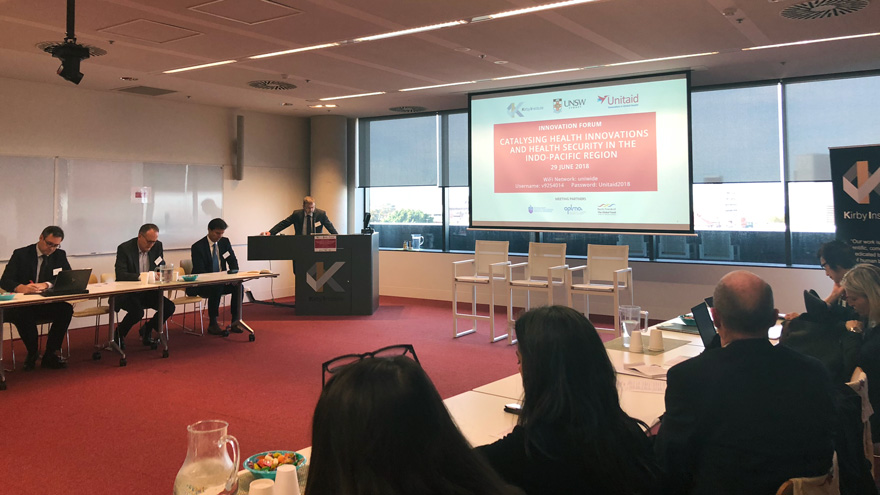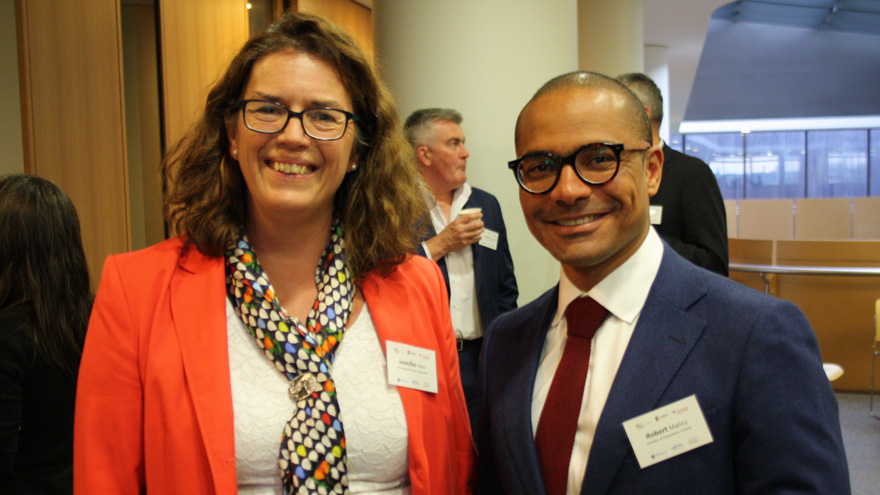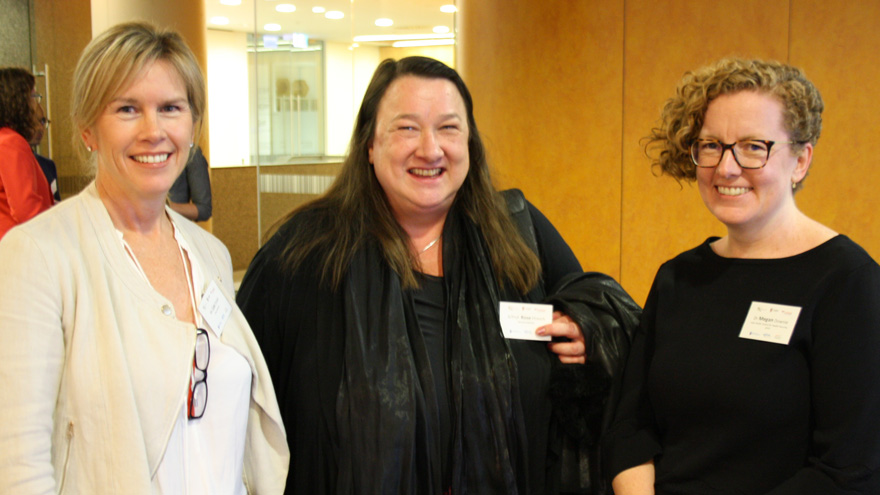First visit by Unitaid Executive Team to UNSW Sydney
On Friday 29 June 2018, the Kirby Institute at UNSW Sydney was pleased to host Mr Lelio Marmora, Executive Director, Mr Robert Matiru, Director of Operations, and other members of the Unitaid leadership team for a bilateral meeting and health innovation forum.
Unitaid is a global organisation that invests in innovations to prevent, diagnose and treat HIV/AIDS, tuberculosis and malaria more quickly, affordably and effectively. They also work to improve access to diagnostics and treatment for HIV co-infections such as hepatitis C and human papillomavirus (HPV).
 Professor Anthony Kelleher welcoming all to the Innovation Forum.
Professor Anthony Kelleher welcoming all to the Innovation Forum.
In 2016, the Kirby Institute was awarded an AUD$12 million grant from Unitaid to conduct a clinical trial to improve treatment options for people with HIV infection. The trial, called D²EFT, is a multicentre, multinational, randomised trial in people with HIV who have experienced failure of first-line anti-retroviral treatment. Since 2016, the trial has expanded to add a third treatment arm, and the clinical trial network is set to grow to include sites in Argentina, Chile, Colombia, India, Malaysia, Mexico, Brazil, South Africa, Thailand, Zimbabwe, Nigeria, Indonesia, Mali and Guinea.
In his opening remarks, Mr Marmora noted that this was Unitaid’s first official visit to Australia, and that they were pleased to mark the occasion with the innovation forum at the Kirby Institute.
“Unitaid’s work is fundamentally focused on identifying and bringing to market innovations that can be game-changers in the global health response,” said Mr Marmora. “One of our key objectives during our visit is to hear more about the innovations in the region on HIV/AIDS, tuberculosis, malaria but also on other issues that threaten health security.”
 Jennifer Herz, Biointelect and Robert Matiru, Unitaid.
Jennifer Herz, Biointelect and Robert Matiru, Unitaid.
Dr Mark Polizotto is Chief Investigator on the D²EFT study, which is funded by Unitaid. “The partnership with Unitaid has allowed us to undertake important research in low income countries that, if successful, will not just change clinical guidelines, but will significantly improve the lives of individuals,” said Dr Polizzotto, who is head of the Kirby Institute’s Therapeutic and Vaccine Research program.
The forum was attended by researchers, clinicians and policy makers working across a range of infectious diseases in the Indo-Pacific region, including representatives from the Commonwealth Department of Foreign Affairs and Trade’s Indo-Pacific Centre for Health Security and the Asia Pacific Leaders Malaria Alliance.
“The Kirby Institute is truly honoured to host our partners and collaborators from all over the world at this important forum,” said Professor John Kaldor, Chair of the Kirby Institute’s interim management committee. “The Indo-Pacific region is vulnerable to a range of infectious diseases, and as a high income country with world class research institutes, Australia can play an important role in facilitating the response to deadly epidemics in our region.”
 Left to right: Liza Doyle, Kirby Institute; Rose Ffrench, Burnet Institute; and Megan Downie, Indo-Pacific Centre for Health Security, DFAT.
Left to right: Liza Doyle, Kirby Institute; Rose Ffrench, Burnet Institute; and Megan Downie, Indo-Pacific Centre for Health Security, DFAT.
Over the course of the afternoon, delegates looked to the future when discussing innovations across three key areas: community-based interventions to chronic infectious diseases, models in clinical care and diagnostics, and emerging and endemic health security threats. Speakers from the Kirby Institute, Unitaid, St Vincent’s Hospital Sydney, UNSW Sydney, Policy Cures, Atomo Diagnostics and Asia Pacific Leaders Malaria Alliance discussed various approaches being implemented to address health issues in the region, featuring presentations on disease areas such as HPV/cervical cancer, HIV, tuberculosis, malaria and neglected tropical diseases, as well as more generalised presentations on point of care technology and preparedness for response to potential epidemics.
The forum was supported by Unitaid, the Kirby Institute, UNSW Sydney, Pacific Friends of the Global Fund, the Asia Pacific Leaders Malaria Alliance and St Vincent’s Centre for Applied Medical Research.
